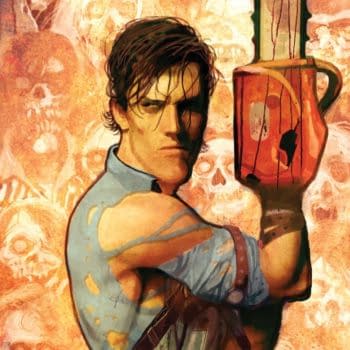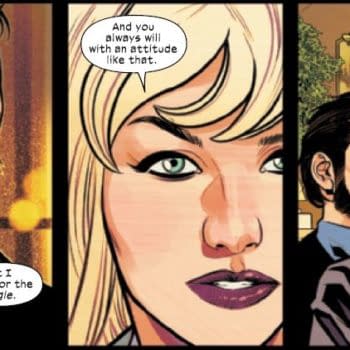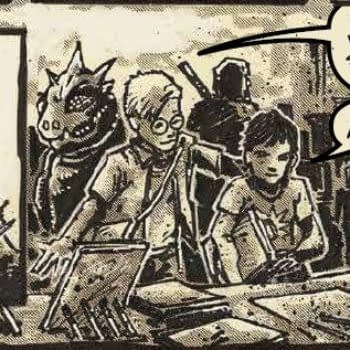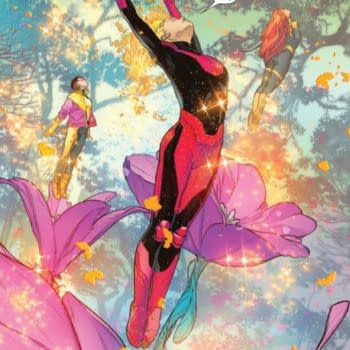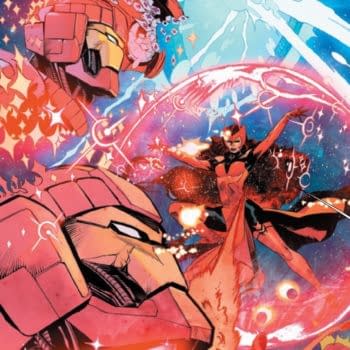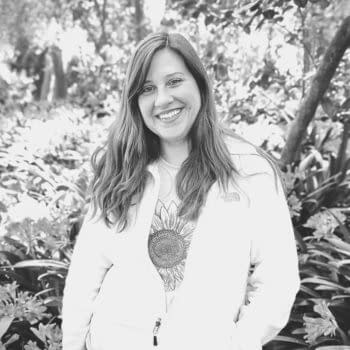Posted in: Comics | Tagged: adi tantimedh, ales kot, Comics, image, wild children
Look! It Moves!: Ales Kot On Wild Children

WILD CHILDREN, the debut graphic novel by Ales Kot, is probably the most ambitious comic out this week.
The book starts with a bunch of teenagers at a privileged school declaring the educational system sucks and taking their teachers and principal hostage at gunpoint. What follows is not what you expect. There are the cops, the kids and the teachers, but beyond that, there are mind-fucks and a serious question of not only the educational system but Reality itself.
WILD CHILDREN is a book in the tradition of political, psychedelic literature that began in the 1960s with the writings of Terrence McKenna, Philip K. Dick and carried on by the likes of Grant Morrison and Alan Moore. It is the work of someone who's spent a long time reading and thinking and bursting to write, a cry from the heart and a calling card of intent, a hunger for sharing books and knowledge and the thrill of discovery.
Ales Kot and I follow each other on Twitter and we've had discussions on movies and books, extolling our mutual admiration of recent cult movies like GAMER and SOUTHLAND TALES. When he sent me an advance PDF reader's copy for my opinion, I was intrigued enough to interview him about it.
From your website and Twitter feed, you're someone who happily wears his interests and influences on his sleeve. What inspired you to write WILD CHILDREN?
Six different schools in 10 or 11 years. I saw a broken system producing perfect tools, but broken humans. I saw perfect tools built for the specifications of the 20th century industrial civilization. I felt the 21st century knocking, and becoming a drone support cell for a system built on a greedy idea of infinite growth was not on my to do list. So I left school when I was seventeen, I moved to Prague, and started focusing only on what I was genuinely interested in.
That change gave me a lot of amazing, intense, layered experiences. Breakcore scene, early dubstep scene, squats, girls, beautiful apartments, underground poetry readings, freeparties/raves, amazing creative friends, reading people like Huxley and McKenna and Lilly for the first time and implementing their ideas in my daily life, occasionally writing bad poetry, boys, more girls, more books, more experiences…lots of ridiculous days and nights.
Then it's 2008, I'm twenty-two, I move into a new apartment, meet a ghost, go through a "Martin Sheen in the hotel at the beginning of Apocalypse Now" routine for about two weeks and survive it. I realize that I want to be doing something that will feel real, something that will give people thoughts and feelings and will open up the world for them. I felt like I finally learned some interesting things, and it was my time to share.
Comics felt like the right choice – I made my first regular 48-page comic as a 5-year-old, which I totally forgot about until recently. The idea for Wild Children came in 2009, and I wrote the first draft later that year, right after I moved to the US. It was fueled by the combination of these two experiences, and by my desire to be very good at something and help people do better.
WILD CHILDREN starts out as a compendium of American hot-button topics: school hostage situations and shootings, ambiguous sexuality, cross-dressing, pop, teenage rage and rebellion, terrorism, the media-saturated landscape and live-streaming of nasty events, acid trips and hypno-suggestion, and a Gnostic exploration of Reality. There is a sense of the thrill of transgression that fuels a lot of pop fiction, of breaking the rules. Was this important to you from the outset?
That's just what the inside of my head looks like most days. I think we create rules so we can evolve by growing around and through them, just like a snake sheds its skin whenever the new one's ready. How Biblical, that previous sentence. It makes sense though, doesn't it? This obsession with rules and transcending them? "Built you up just to just put you down/what a clown". I think we're playing a game, and we call it "Evolution".
According to a recent World Health Organization study, 31% of Americans are likely to suffer from an anxiety problem at some point during their lifetimes — compared to 25.3% of those in Colombia, and 24.6% in New Zealand, the countries that rank second and third. When we're scared, rules make us feel temporarily safer, because they impose some amount of (however imaginary) order on things. And many of us are incredibly scared of chaos, and see it as a force of evil. The amount of Hollywood movies about order being the "good guys" and chaos being the "evil" element is symptomatic of that fear. I'm bored with that. I want something more complex, something closer to reality. Because — and this is something people get wrong sometimes — reality isn't just boring and black and white and grey. Reality is absolutely anything you want it to be.
I wanted a story that would merge order and chaos, creating something more complex. Do we make our own reality? If so, what does the reality we currently live in say about who we are? If everything around me is a projection of who I am, why are we even having this conversation? What am I trying to do here?
I ask myself questions like these at least a few times per week, usually way more often than that. It's much more interesting than living my life in fear. The potential is infinite.
How did you go about plotting out the story? Did you know how it would end or was it a process of feeling your way through the ideas until your reached the logical conclusion of what you wanted to say? Did you already have the ending in mind when you began writing it?
I knew what would happen at the end; I had the story tightly plotted, and the end came in the beginning, as it often does. But I rewrote the entire thing about six times, and I realized I wanted the comic to become more complex, more cerebral, a denser storytelling experience. Essentially something that would morph under my eyes – and under the eyes of our readers. So I started injecting chaos into the narrative. A sentence here, a scene there. Things I can't explain via classic storytelling structures, but I had to add them because they fit. And to my genuine shock, the comic became alive, exactly as I wanted it to.
I tend to think we spend our adolescent years being, basically, psychopaths. Our brains are being rewired and our hormones are firing off like crazy, so it's not like we can help it. Everything is new and important and intense and hysterical and fun or horrible at the same time. Was there any irony in your depiction of your teenage rebel heroes as Counter-Revolutionaries Against Consensus Reality? Or did you want them to be the heroic philosopher-poets they see themselves as?
Irony? Definitely. I felt the urge to write this as a multi-faceted experience, and I could definitely see the irony of it all. From one angle, these kids are misguided, pop-obsessed psychopaths. In light of that, the last page has a significantly different meaning. I think I read 'Wild Children' after we finished making it about 6-7 times, and I found at least five different storytelling angles, each making the story completely different. Most of them were intended, but some were happy developments created by my indulging in the chaotic side of things.
Aside from the head-trip of THE INVISIBLES, the book is also reminiscent of Grant Morrison's Teenage Rebellion Diptych ST. SWITHIN'S DAY and KILL YOUR BOYFRIEND. Is it fair to say that Morrison has been an influence on your work here (aside from Hakim Bey, Alan Moore, Georges Bataille, probably Rimbaud and various others)?
Absolutely. I wouldn't be the writer — or the person — I am without Grant Morrison's influence. I discovered 'The Invisibles' when I was nineteen or twenty, and by that time I already read about or lived through a lot of what he describes in the comic, but seeing a unified theory of sorts in one comic was incredibly exciting and life-affirming. "Look at this! Someone else is interested in all this shit! And they know more than I do! And this happened to them as well and I have no idea what this is but I want to know more! Yay!"

I haven't read 'St. Swithin's Day' as of yet, but I'm familiar with the story behind it. 'Kill Your Boyfriend' was one of the two biggest fictional influences on 'Wild Children', the other being 'Hellblazer: Shoot' by Warren Ellis and Phil Jimenez. I always loved both, and I also see them as products of the mid-to-late-90's aesthetic. They hold up well, but I felt like there was another story waiting to be told. 'Wild Children' came from that notion. "How do I honor the ideas of these comics while simultaneously pushing them forward?" was one of the first questions I had to answer.
Would you like to talk more about your influences in the book? It feels like you were bursting to write a graphic novel.
I love the way Godard's 'Pierrot Le Fou' messes with itself. Gus Van Sant's 'Elephant' is a very sensitive study of school shootings, and beautifully shot. Music by people like Pictureplane, Fuck Buttons, Nosaj Thing, The Chemical Brothers…that deep, meditative quality of mid-00's dubstep, stuff like Digital Mystikz and Loefah. Early Planet Mu, and Ad Noiseam releases, the breakcore/idm stuff. That quality of something that sounds and is incredibly broken but inherently whole and coherent if you just look at it long enough, because even the smallest part of our Universe will always contain everything, every possibility. Holographic awareness.
That reminds me of something I read today – do you know why is Higgs Boson called "the God Particle"? It comes from a title of a book by this important physicist, Leon Lederman, whose title was "The Goddamn Particle", because he was frustrated with trying to nail the Higgs Boson. His publisher thought that "Goddamn" would be offensive, so they changed it to "God".
The idea of holographic awareness is something I can see in almost everything I've lived through – I think it's a way of our imagination showing us that we're in charge of the "content", so to say. And since it seems that we're in charge of our imaginations, it's about time we flexed them and figured out what they can do when we really try to imagine a new, beautiful now.
Some wonderful books on imagination and process that also influenced 'Wild Children', and that I often come back to, are David Lynch's 'Catching the Big Fish', 'Do Anything' by Warren Ellis, Alan Moore's 'On Writing Comics', Andrei Tarkovsky's 'Sculpting in Time', the Eisner/Miller book Charles Brownstein edited and more. 'The Evolutionary Mind', a book of conversations between Sheldrake, McKenna and Abraham, so it's a biologist, a psychedelic scientist/visionary, and a chaos mathematician in one room talking about life. I remember reading the Bradbury & King books on writing years ago, and those definitely influenced me as well. I also recently finished 'Cronenberg on Cronenberg' and it's fantastic.

The book strikes me as a cry from the heart, protesting against the fact that we live in a reality that sucks right now. It also feels like the condensation of the last 15 years' worth of thinking and reacting to the ether and trying to make sense of it through reading and thinking. Is this a fair assessment?
Yes, but it's also incomplete. This reality can suck pretty bad, yes. Right now, most of us are still learning how to build worlds that won't fall apart two days later. It's like watching children build sand castles. But mix the sand with some other materials, and you can build amazing things that will endure centuries.
Do you want a better world? Start dreaming of it, and start acting as if you were already living in it – not by overlooking things that don't fit, but by acting precisely how you would like your ideal human being to act. Because, after all, if you want to meet an ideal human being, you'll probably have to build it out of yourself. It's not an easy job, but it's an amazing one. Imagination + Will = Reality, usually.
How important as it to you to use the medium of comics to not only get the ideas across, but to also declare that this is a comic in the Pirandellian sense, of emphasising that this story is still a fiction, but no less potent for being fiction?
Well, from my very limited understanding of his life and work – something I want to remedy as soon as possible – Pirandello refuses to see the difference between internal and external. "I am this tree. The book that I read…" and such. That certainly connects. The veil between fact and fiction is incredibly thin, and we transcend it on a daily basis.
So do you see comics as a viable medium for communicating unusual or out-there ideas because they don't need to be beholden to corporate-mandated standards?
Definitely, yes. I don't think anything needs to be beholden to corporate-mandated standards, but comics are very cheap and fast to make. Then again, so are movies these days. A friend of mine recently remarked that shows like Gossip Girl, in order to reflect the reality of where we are now, should take place on cellphone screens 75% of the time.
I hear you're also doing some writing for DC Comics. How will you reconcile writing superhero stories with your own more personal work? Do you see them as separate or that they might inform each other? I'm asking because much as I enjoy Grant Morrison's work, he's gone from discussing Politics and Reality in his own work to funneling his views of a unified created reality into an Everything's Superhero or Everything's Batman view, which may be fun, but fills me with ambivalence.
Nothing is separate, everything is connected. If I'm writing a story, I want to create a feeling, a resonance, I want to bring new thoughts and possibilities into readers' lives, regardless if it's a corporate-owned story or a creator-owned one. I love superheroes and I think they're an incredibly important ideal. The thing that I never want to lose sight of is this: at their core, superheroes are not about beating each other or looking cool or getting the girl or boy. They're about ethics.
So in order to write them right, I need to be a deeply ethical person in the first place. I think I'm doing fine for the most part, but I'm still figuring some things out.
Do you worry about readers or naysayers complaining "It's been done before" or "preaching to the converted"? Or you feel that this work is valid because it's your interpretation of the ideas and your exploration to make sense of them? And is "preaching to the converted" such a bad thing when it's really a place for like-minded people to rally around?
No, I don't worry about it. I suspect some readers might feel that way, simply because the creative path I'm on so far is similar to other creators who create unusual stories that are also decidedly mainstream. That means we were reading similar books and living similar (to some extent) lives. Their works influenced me, of course, but I'd be a shit writer if I wouldn't integrate all that influence into something that feels like me and not like a thirty-fifth rehash of the same thing. Comics have enough of those.
I want every comic I create to be strikingly different and unique, and that means doing new things, and also exploring some ideas we've seen before in new ways, or simply digging deeper. Some people are scared of new or unusual ideas, but that's fine. It feels like the right path to take, and that's all that matters.
[youtube]http://www.youtube.com/watch?v=wjTxJRjwfi4[/youtube]
WILD CHILDREN is published by Image Comics. You can follow Ales Kot via http://www.aleskot.com and http://www.twitter.com/ales_kot. Copies can be ordered online here and here.
Still trying to transcend three dimensions at lookitmoves@gmail.com
Follow the official LOOK! IT MOVES! twitter feed at http://twitter.com/lookitmoves for thoughts and snark on media and pop culture, stuff for future columns and stuff I may never spend a whole column writing about.
Look! It Moves! © Adisakdi Tantimedh









